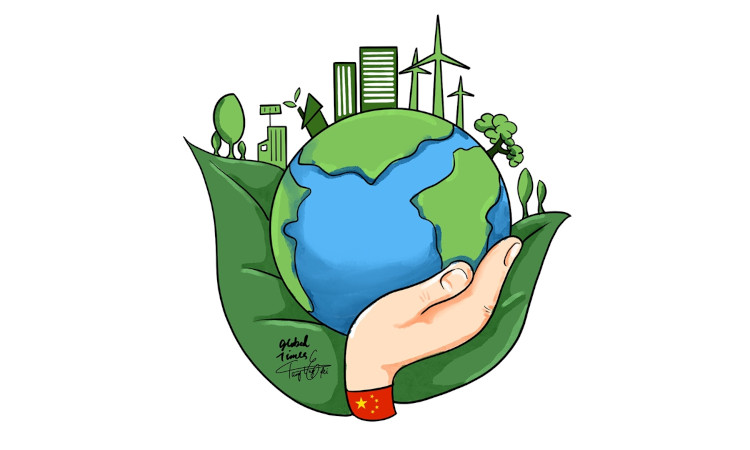A report released in December 2021 by the green finance committee, established by the People’s Bank of China, projects Chinese investment in carbon-neutral technology to reach the equivalent $75tn over the next 30 years.
This is a figure that will far outstrip even the ambitious estimates of a widely-circulated Goldman Sachs report from January last year, which predicted $16tn in investment.
Set alongside the Belt and Road initiative – which sees Chinese investment developing the infrastructure for trade routes across Asia and further afield – the finance committee’s document presents a state-driven investment plan that will see China’s commitment to green technology realised both domestically and overseas.
A level of investment never before seen
This will be the most serious attempt so far, on the part of any government, to address the factors causing climate change.
As reported by the Asia Times, the report states:
“Zero-carbon electricity will become a reality, and most power generation needs will be met by non-fossil energy, mainly through renewable energy, nuclear power and a small amount fossil-fuel generators equipped with carbon capture and storage technology (CCS).
“Almost all building energy, about half of transportation and industrial energy use will employ zero-carbon electricity so as to achieve extremely low emissions.
“Buildings equipped with energy-saving technologies such as distributed photovoltaics will achieve negative carbon emissions.
“More than 10 percent of transportation modes including aviation and heavy vehicles will be powered by biofuels or green hydrogen.
“Although it is still difficult for the industrial sector to achieve zero carbon emissions as a whole, hydrogen technology will reduce fossil fuel use and achieve ultra-low carbon emissions.
“The rest of the goal of zero carbon emissions will be achieved through carbon capture and utilisation technology and carbon sinks.”
As well as being the means by which China will achieve carbon neutrality by Xi Jinping’s target of 2060, the Asia Times indicates that this investment will ensure Chinese dominance across the spectrum of green technologies.
Britain being left behind
All this is a far cry from the chaos and corruption of investment projects in Britain – from the calamitous financial black hole that is the HS2 project to the fatal inefficiencies that characterised our government’s Covid response.
When long-term state-driven investment is guided not by concerns of immediate profit but by achievable long-term targets, it can afford to be ambitious. More importantly, it can be put to the genuine service of the people.
When, on the other hand, it is administered by a revolving door of ruling-class representatives who move seamlessly between Westminster, Whitehall, Fleet Street and the private sector, whose concern is only for this year’s bottom line, any kind of large-scale investment will serve only as a siphon to line the pockets of that same clique of cronies and their monopolist masters.
Again and again, the anarchic system of production that underlies the imperialist system has shown that capitalism is in no way capable of solving the problems that it has caused – whether that is the climate crisis, the massive and growing inequality between rich and poor, homelessness, joblessness, or the provision of healthcare and other services.
Faced with the success of the Chinese approach, the response of imperialist nations is not to mend their own ways but to manufacture reasons for sanctions and conflict – distrust over Huawei 5G, lies about Xinjiang, interference in Hong Kong and Taiwan. The shoddy system of production for profit and the lies our media tell to prop it up must be exposed and resisted.
The real long-term solution
Despite being the most remarkable and far-sighted drive yet to address climate change, any such projects that are ultimately susceptible to the risks of the global market – as the entire Chinese economy has become since reform and opening up – will fail to address the elephant in the room, which is the entire system of production for profit itself.
It is the market system – and the profit-seeking motive that drives it – that has laid waste to our environment, and will continue to do so until it is removed.
That China has the ability and means to direct large resources into state-led investment principally for the benefit of its people is a legacy, not of the years of reform, but of the strengths of the socialist economy that preceded them.
For example, a paper produced by four western economists – from the Federal Reserve Bank of Dallas, Princeton and Yale universities and Sciences Po in Paris – extrapolated faster growth for China between 2036 and 2050 under “Maoist” policies when compared to the same period projected under current policy. (What if Mao still ran China? by Jamil Anderlini, Financial Times, 9 August 2015)
David Daokui Li, an economist at Tsinghua, has given further details on the tremendous achievements of the Mao years:
“Between 1949 and 1979, life expectancy nearly doubled from 35 to 66; from 1949 to 1982, adult illiteracy rates fell from 80 percent to 23 percent; gender equality was achieved in elementary education. Without these, the rapid growth after the 1979 opening and reforms would not have been possible.” (Lessons from the first 70 years of the People’s Republic of China, Financial Times, 1 October 2019)
China’s socialist economy of those early years has therefore provided it with the strength to play fast and loose with the market post-1978. But it is playing with fire – as the Evergrande crisis has shown. Market reforms lead intrinsically to crises of overproduction and will jeopardise all attempts by the state to intervene and to plan over the long term.
For the sake not only of the Chinese people and their revolution, but for all of humanity, it is to be hoped that China is able to step back from the brink before it is too late. Meanwhile, the people-centred government of the Communist Party of China (CPC) is exposing the hollow talk of greenwashing monopoly capital for what it is: empty phrasemongering aimed at pulling the wool over the people’s eyes, productive of not a single meaningful advance despite decades of summits and treaties.
Let workers everywhere understand that this is not the result of bad leaders, but of the logic of capitalist production for profit. The only real long-term solution to the problems created by capitalism – in Britain and across the world – is wholesale commitment to revolutionary change and a socialist economy free from the market’s corrosive effects.
The understanding that must permeate our class is that you have to be red to be green.














